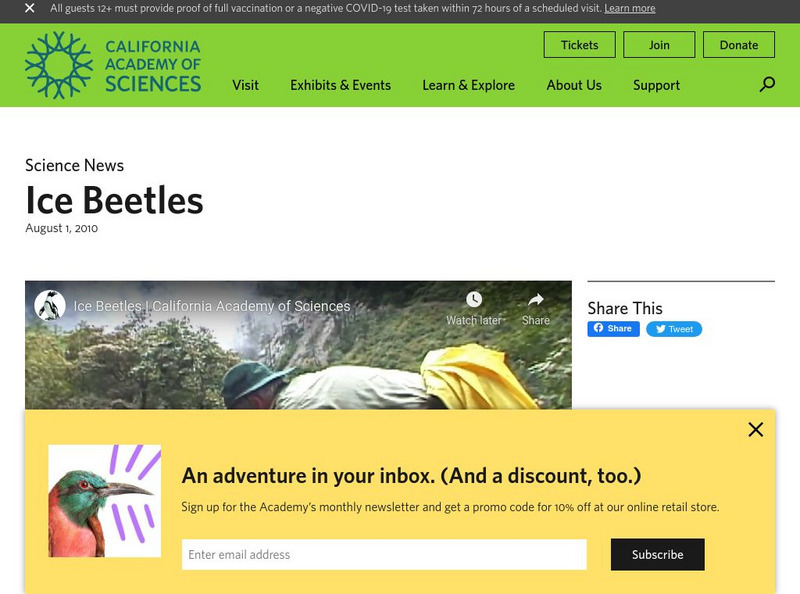Hi, what do you want to do?
FuseSchool
BIOLOGY - Environment - Global population growth
From about 2 million years ago until 13,000 years ago there were several human species inhabiting the earth. In fact, 100,000 years ago there were at least 6 different human species! Today there’s just us: Homo sapiens. In this video...
Cerebellum
Prehistoric Man Human Evolution Upper Paleolithic - Early Modern Humans
Beginning in the late nineteenth century and throughout the twentieth century, geologists, archaeologists and paleoanthropologists have given the world evidence of the physical and cultural development of humans. Amazing discoveries...
Curated Video
Archaeologists unveil 100,000-year-old burial site in Israel's cave
Archaeologists think they have uncovered one of the oldest burial sites globally within a cave in Israel, where the remarkably preserved remains of early humans, dating back approximately 100,000 years, were meticulously arranged in pits.
Curated Video
Archaeologists discover intact 90,000-year-old human footprints on Moroccan beach
In 2022, researchers stumbled upon the footprint site near the northern tip of North Africa while examining boulders at a nearby pocket beach.
Curated Video
Swedish scientist Svante Paabo wins Nobel Prize in medicine
Svante Paabo wins the prestigious prize for his discoveries on human evolution.
Curated Video
Should You Trust Your Employer's New AI Tool?
Tatyana Mamut, CEO and founder of Wayfound.ai, explains why business owners and employees are wary of new AI tools in the workplace at Web Summit Vancouver
Curated Video
Dicovery: scientists believe mystery fossil is Denisovan, early human ancestor
A fossilized human jawbone discovered in Taiwan is now thought to belong to a Denisovan, an ancient human relative.
Bloomberg
Jeremy Grantham Says Stock Market, Economy Are 'Secondary' Worries
GMO co-founder and permabear Jeremy Grantham says the economy and stock market are "very secondary" to the challenges he sees facing the world. The billionaire investor has pledged the bulk of his fortune to fighting the climate crisis,...
AFP News Agency
CLEAN : French cave discovery dates modern man's arrival in Europe much earlier
Modern man, Homo sapiens, ventured into European Neanderthal territory much earlier than previously thought, according to a discovery made by Ludovic Slimak's team at the CNRS (National Centre for Scientific Research, Eds.) in Toulouse,...
Curated Video
Israeli archaeologists discover new evidence of early man
Rosh Ha'ain - 27 Dec 2010
1. Exterior wide shot of archaeological site found in central Israel
2. Various interior shots of archaeological site
3. Pan from road to archaeological site
4. Various of findings
5. Close up of teeth found at...
Curated Video
Israeli archaeologists discover new evidence of early man
1. Wide exterior shot of archaeological site found in central Israel
2. Various interior shots of archaeological site
3. Pan from road to archaeological site
4. Various of findings
5. Close up of teeth found at site
7. Archaeologist, Avi...
Crash Course
Why Human Ancestry Matters: Crash Course Big History #205
Genetic variation makes for stronger species, but for a mammalian species, humans are disturbingly closely related. Help your class explore human ancestry and genealogy using the 15th video in a 16-part series. It describes how we became...
Crash Course
Why Human Evolution Matters: Crash Course Big History #204
Is the progression of human complexity due to eating meat? The 14th video in a 16-part series attempts to answer this and other thought-provoking questions. It relates the process of human evolution and innovation to our ability to learn...
PBS
When We Tamed Fire
Was the first use of fire intentional or accidental? Although the answer to the question may never be known, we do know that the discovery of fire was a turning point in humans' evolution. Explore the history of fire use and its...
PBS
The Humans That Lived Before Us
You may struggle to find similarities between humans and many of our ancestors. Fossil evidence finds more and more signs of similarities between humans and many other species. A lesson outlines the fossil evidence and the questions...
Crash Course
Human Evolution: Crash Course Big History #6
Humans did not evolve from monkeys or chimpanzees—so what does our evolution look like? A video explains the evolution of humans from a common ancestor to homo sapiens. It describes the many branches on our family tree as well as the...
SciShow
Facts about Human Evolution
In 2004, scientists found skeletons of a hobbit-like creature in Asia. This discovery is just one more part of the large human evolution puzzle. Scientists continue to build the puzzle with missing pieces and confusing information. This...
PBS
Pbs Learning Media: Homo Sapiens Versus Neanderthals
This video segment, adapted from NOVA, explores reasons why Homo sapiens had an advantage over Neanderthals in the pursuit of territory and natural resources. [4:55]
PBS
Pbs Nova: Becoming Human, Part 1
"Where did we come from? What makes us human?" Becoming Human is a three-part comprehensive examination of the latest research on our hominid relatives. Part 1 takes a critical look at what set us on the path from ape to human. The...
PBS
Pbs Nova: Becoming Human Part 1: First Steps
NOVA examines what set Homo sapiens apart from our ancestral cousins like the Neanderthals, the Hobbits, and others. We lived and thrived, why? Also, are we still evolving even today?
Science Friday Initiative
Science Friday: How Homo Sapiens Became Masters of the Planet
Ian Tattersall, author of Masters of the Planet, talks about the origin of humans, and how Homo sapiens became a dominant species. Aired Apr. 6, 2012 [38:44 min]
Khan Academy
Khan Academy: Human Prehistory 101 Part 1: Out of (Eastern) Africa
Second in a series of videos that introduces human prehistory, this video describes how our human ancestors spread throughout Africa and then into other regions such as Australia and Europe. How did they reach Australia so early on? What...
California Academy of Sciences
California Academy of Sciences: Human Tool Use
The Academy's Zeray Alemseged's recent discovery pushes human tool-use back over 800,000 years. [2:57]

















